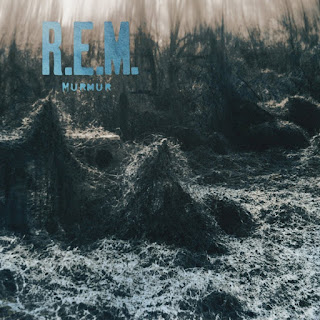R.E.M.: Murmur (1983)
I arrived at college in the fall of 1984. I had been an obsessive rock fan throughout middle school and high school. Classic rock, prog, new wave, whatever I could get my hands on. I was optimistic that when I got to college, however, that I would be exposed to all sorts of music that had evaded the narrow confines of my suburban youth. Great music ignored by radio. Something edgy and wonderful.
Instead, I got Bruce Springsteen's Born in the USA and Prince's Purple Rain blasting from every dormitory window, every radio on campus. Great albums, sure, but where were all the great new discoveries I'd anticipated? Shouldn't college students be open to something more interesting than what was dominating the Top 40 airwaves?
Fortunately, I ultimately found the students that shared my passion for new music outside the mainstream. I joined the college radio station, where every week saw great new albums rolling in, where the shelves were filled with amazing music I had never heard before. This was the heyday of "college radio," the precursor to alternative rock, indie rock, whatever it goes by these days. The Replacements, the Feelies, Husker Du, Minutemen, Sonic Youth, and on an on.
The band that made the biggest impression on me was R.E.M. I was turned onto their debut EP (Chronic Town) and their first two albums (Murmur and the recently released Reckoning) at the same time, and they all blended together for me into one fantastic piece of work. Here was a band that took elements of some of my favorite bands -- the Byrds, the Velvet Underground -- and wove them into something fresh and exciting. Peter Buck's jangly treble-heavy arpeggiated guitar picking that eschewed power chords, Mike Mills' melodic baselines and wavering harmonies, Bill Berry's snappy snare, and above all Michael Stipe's cryptic mumbles, largely indecipherable yet nonetheless suggesting gravitas and significance, bending to interpretation.
Unlike some of the more thrashing or experimental underground albums of the time, this sounded non-threatening and radio-friendly. It struck me as the sort of music that should be all over the radio, dominating MTV, blaring from every window on campus... yet it seemed largely to exist outside of mass awareness (despite rave critical reviews). This made no sense to me. But it also meant that, if a band like R.E.M. could be this great and still evade the mainstream, who knew how much other great music I had been missing. It was the discovery of Murmur and Reckoning which gave me hope, inspired me to search for other artists and albums I knew had to be out there, a search that has continued unabated for 35 years.
Here they are on Letterman in '83:

More weird coincidences here. You talk about arriving at college and getting into REM. I arrived at college a few years later, I distinctly remember Murmur playing in the tape deck as I drove through the hills toward Berkeley for the first time on a dark, rainy day. And I did a several month midnight stint at KLAX when the station was filled with rooms of vinyl.
ReplyDeleteHard to put into words what Murmur sounds like; it's utterly fascinating and unique.
I'm a couple years older than you, and REM was similarly devastating to my way of thinking about music. They and U2 (I got into them right after October) formed the basis of bands I liked for some years. You could almost start a conversations at that point with "Are you into REM or U2?" If they weren't, the conversation might have ended there. I went from the Stones/Beatles/Who right into these guys.
ReplyDeleteI hear what you're saying about the U2/R.E.M. bond. I didn't have quite the same connection with U2, probably because, as you say, I was a couple years behind you, and discovered them as the songs from War were dominating MTV. And I liked those songs (certainly relative to most of what MTV played), as well as later albums, but I did view them as a much more commercially palatable band, the sort of MTV hits I was rejecting when I discovered R.E.M. (and the Replacements and Husker Du and the Feelies etc.). Plus, while I appreciate the Joshua Tree as a sonic marvel, it was such an omnipresent monster when it came out, that again I ended up largely sidestepping it (though I liked some of the stuff on side two that didn't get the same radio/MTV blanketing as the opening tracks).
Delete